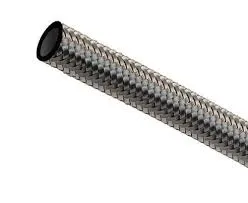Nov . 27, 2024 01:23 Back to list
Stainless Steel Wire for Durable Metal Hose Applications
The Evolution and Importance of Stainless Steel Wire in Metal Hose Production
Stainless steel, known for its resistance to corrosion and durability, has become a fundamental material in various industries. One of the prominent applications of stainless steel is in the production of metal hoses, where stainless steel wire plays a critical role in enhancing the performance and longevity of these hoses. Understanding the intricacies of stainless steel wire in metal hose construction reveals its significance in ensuring reliability and efficiency across multiple sectors.
The Composition and Properties of Stainless Steel Wire
Stainless steel wire is primarily composed of iron, with varying percentages of chromium, nickel, and other alloying elements. The inclusion of chromium is crucial, as it forms a protective layer of chromium oxide on the surface, preventing corrosion and enhancing the material's longevity. Additionally, the mechanical properties of stainless steel, such as tensile strength and ductility, make it an ideal choice for applications requiring flexibility and resilience under extreme conditions.
In the context of metal hoses, stainless steel wire not only provides structural reinforcement but also contributes to the hose's resistance to high temperatures and pressures. This capability makes stainless steel wire hoses suitable for transporting a wide range of substances, from gases to liquids, in sectors such as chemical processing, oil and gas, and food and beverage production.
Manufacturing Process of Stainless Steel Wire for Metal Hoses
The manufacturing process for stainless steel wire involves several stages, each critical to ensuring the wire meets the necessary specifications for use in metal hoses. Initially, billets of stainless steel are cast and then hot or cold drawn into wire form. This drawing process decreases the wire's diameter while increasing its length, enhancing its strength and flexibility.
stainless steel wire of metal hose product

After drawing, the wire undergoes a series of processes, including annealing, which involves heating the wire to relieve internal stresses, thus improving its ductility. Following annealing, the wire is often cold rolled to refine its surface finish and achieve the desired thickness. Quality control measures are implemented throughout the production process, with tests for tensile strength, corrosion resistance, and dimensional accuracy ensuring the wire’s reliability in demanding environments.
Applications of Stainless Steel Wire in Metal Hoses
The versatility of stainless steel wire enables its use in various metal hose applications. For instance, in the automotive industry, stainless steel wire metal hoses are used for exhaust systems, providing flexibility and resistance to harsh thermal environments. In the chemical industry, these hoses safely convey aggressive chemicals without the risk of leaks or contamination, thanks to their robust construction.
In the food and beverage sector, stainless steel wire hoses play a pivotal role in maintaining hygiene standards. Their non-reactive properties prevent contamination, ensuring that products remain safe for consumption. Additionally, their ability to withstand cleaning processes, such as steam cleaning and chemical sanitization, makes them a preferred choice for food processing plants.
Conclusion
The significance of stainless steel wire in metal hose production cannot be overstated. Its unique properties contribute to the durability, flexibility, and resistance of metal hoses, making them indispensable in various industries. As technology advances, the demand for more efficient, reliable, and versatile metal hoses will continue to grow, reinforcing the importance of high-quality stainless steel wire.
In summary, stainless steel wire serves as the backbone of metal hose production, enabling safe and effective transport solutions across multiple sectors. As industries evolve, the role of stainless steel wire in enhancing performance and meeting regulatory standards will remain crucial, highlighting the ongoing necessity for innovation and quality in this field.
-
Best Four Steel Wire Spiral Hose Hydraulic R12 – Durable High-Pressure Hose Manufacturer
NewsJul.08,2025
-
High-Quality 1/4 Hydraulic Hose – Soft, Flexible & Durable Rubber Hoses for Industrial Use
NewsJul.08,2025
-
1 1 2 Inch Hydraulic Flexible Hose - Durable, Reliable, High-Pressure Solutions
NewsJul.07,2025
-
High-Quality 1 2 Rubber Hose - Durable, Flexible Hydraulic Solutions
NewsJul.07,2025
-
Discover SAE Hydraulic Hose Types - High Quality & Durable Hoses from Leading Factory Supplier
NewsJul.06,2025
-
High Pressure Wire Hydraulic Rubber Hose Supplier Durable & Reliable 1SN Hose Solutions
NewsJul.06,2025
